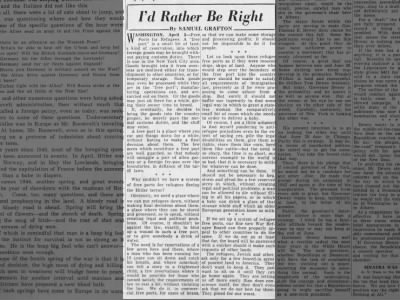- Headline
-
I'd Rather Be Right
- Publication Date
- Wednesday, April 5, 1944
- Historical Event
-
President Establishes War Refugee Board
This database includes 483 articles about this event - Tags
- Article Type
- Location
- Page Section and Number
- 6
- Author/Byline
- Samuel Grafton
- Article Text
- WASHINGTON, April 5—Free Ports for Refugees: A "free port" is a small bit of land, a kind of reservation, into which foreign goods may be brought without paying customs duties. There is one in the New York City area. Goods brought into it from overseas are destined either for transshipment to other countries, or for temporary storage. Such goods may even be processed while they are in the "free port"; manufacturing operations can, and are, carried out on them. Or the goods may just sit there for a while, giving their owner time to brood.
If, eventually, he decides to bring the goods into the country proper, he merely pays the normal customs duties, and the stuff may enter.
A free port is a place where you car[sic] put things down for a while, without having to make a final decision about them. The few acres which constitute a free port are well guarded, so that nobody will smuggle a pair of alien garters or a foreign fry-pan over the boundaries, in defiance of the tariff laws.
* * *
Why couldn't we have a system of free ports for refugees fleeing the Hitler terror?
Obviously, we need a place where we can put refugees down, without making final decisions about them, a place where they can be stored and processed, so to speak, without creating legal and political problems. Of course, it shouldn't be against the law, exactly, to bind up a wound in such a free port, or to give somebody a drink of water.
The need is for reservations of a few acres here and there, where a man who has been running for 10 years can sit down and catch his breath, and where somebody can tell a story to a frightened child; a few reservations where it would be possible for those who cannot satisfy the requirements of law to rest a bit, without violating the law. We do it, in commercial free ports, for cases of beans, so that we can make some storage and processing profits; it should not be impossible to do it for people.
* * *
Let us look upon these refugee free ports as if they were moored ships, ships of land. Anyone who would step over the boundary of the free port into the country proper should be made to satisfy all requirements of immigration law, precisely as if he were proposing to come ashore from a ship. But surely it should not baffle our ingenuity to find some legal way in which to grant a stateless woman the comparatively small bit of room which she needs in order to deliver a baby.
Of course, I am a little ashamed to find myself pandering to anti-refugee prejudices even to the extent of saying yes, pile the legal disabilities on them, give them no rights, store them like corn, herd them like cattle—but the need is so sharp, the time is so short, our current example to the world is so bad, that it is necessary to settle for whatever can be done.
And something can be done. It should not be necessary to beg, storm and plead for a few reserved acres in which, without creating legal and political problems, a man can be allowed to die without filling in all his papers, or in which a baby can drink a glass of that strange white stuf which an older European generation knew as milk.
* * *
If we set up a system of refugee free ports, our fine new War Refugee Board can then properly appeal to other countries to do the same. If we do go at least that far, the board will be answered with a snicker should it make such requests of other lands.
The refugees, Jewish and other, ask only for a few fenced-in acres of poorest land in America. They don't want to keep it. They just want to sit on it until they can go home again. They are letting us off more easily than does conscience itself, for they don't even ask that we do our best for them. They plead for our worst. - History Unfolded Contributor
- Shannon S.
- Location of Research
- Newspapers.com (https://www.newspapers.com)
Learn More about this Historical Event: President Establishes War Refugee Board
- War Refugee Board: Background and Establishment (Encyclopedia Article)
- War Refugee Board: Activities (Encyclopedia Article)
- The War Refugee Board (The Holocaust: A Learning Site for Students)
- Franklin Delano Roosevelt (Encyclopedia Article)
- Henry Morgenthau Jr. (Encyclopedia Article)
- The United States and the Holocaust: Rescue Attempts (Encyclopedia Article)
- United States Policy and Its Impact on European Jews (Encyclopedia Article)
Bibliography
Breitman, Richard. Official Secrets: What the Nazis Planned, What the British and Americans Knew. New York: Hill and Wang, 1998.
Breitman, Richard, and Alan Kraut. American Refugee Policy and European Jewry, 1933-1945. Bloomington: Indiana University Press, 1987.
Feingold, Henry L. Bearing Witness: How America and Its Jews Responded to the Holocaust. Syracuse, NY: Syracuse University Press, 1995.
Gurock, Jeffrey S., ed. America, American Jews, and the Holocaust. New York: Routledge, 1998.
Lipstadt, Deborah E. Beyond Belief: The American Press and the Coming of the Holocaust, 1933-1945. New York: Free Press, 1986.
Neufeld, Michael J., and Michael Berenbaum, eds. The Bombing of Auschwitz: Should the Allies Have Attempted It? New York: St. Martin's Press, 2000.
Wyman, David S. The Abandonment of the Jews: America and the Holocaust, 1941-1945. New York: The New Press, 1998.
Wyman, David S. Paper Walls: America and the Refugee Crisis, 1938-1941. New York: Pantheon Books, 1985.
All articles about this event
